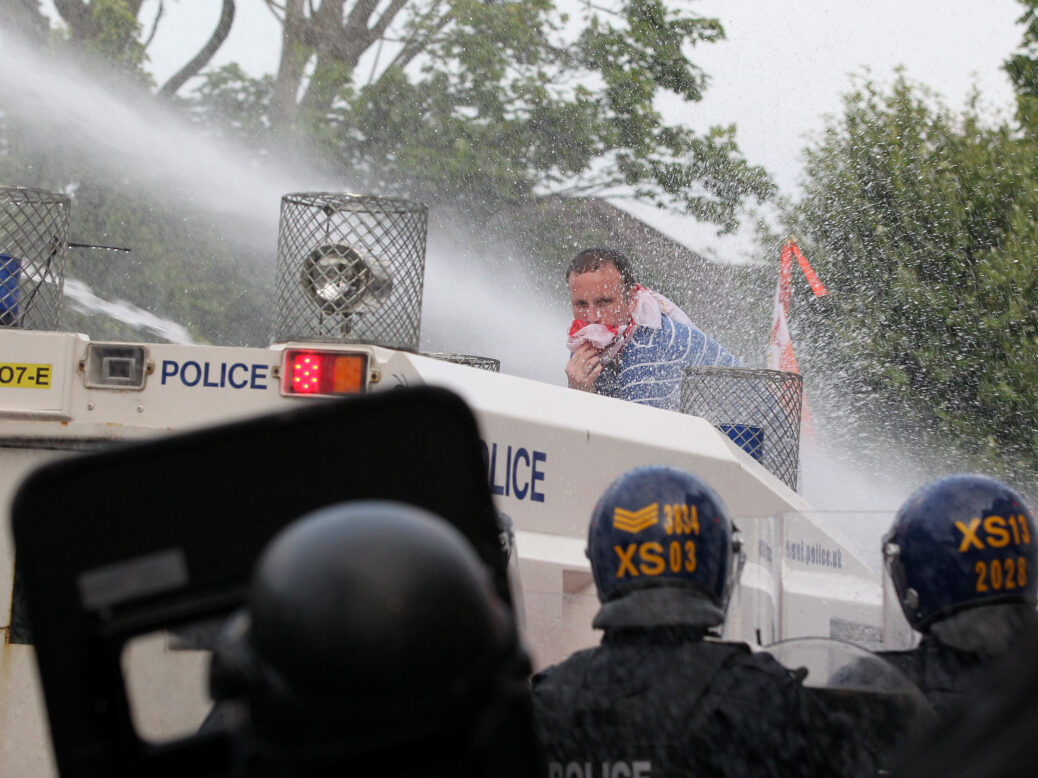
London is a city that resists annotation. Graffiti, especially the political sort, gets scrubbed away as quickly as it appears. But in the boroughs where the Metropolitan Police’s controversial “stop-and-search” policy has made a generation of black and Asian youths feel unwelcome in their own city, one tag – “ACAB” – keeps getting scrawled in angry capitals on walls and hoardings in the margins of urban space. You can even see the letters faintly on Google Maps, badly erased from the wall of Tottenham Police Station.
If you associate with a lot of anarchists, squatters or people under the age of 25, you will probably know that “ACAB” stands for “All Cops Are Bastards”. Whether or not you agree with the statement, it is hard to disagree that relations between civilians and the police, always a better barometer of the public mood than any poll, are not friendly.
The Met and the Mayor of London want water cannon ready for use this summer. Although these have been used for decades in Northern Ireland, they have not yet been part of the machinery of riot control on the so-called British mainland. The mayor will soon decide whether to spend £200,000, at a
time of drastic budget cuts, on high-pressure water jets designed to clear rioters from the streets. At the public consultation I attended on 17 February at City Hall, the police officers tasked with making the case for water cannon in London had profoundly misjudged the mood in the room.
The audience was full of middle-aged academics, journalists, teachers and charity workers, the sorts of people who go to anti-war protests with foil-wrapped sandwiches and a flask of tea. These, technically, are the kinds of “peaceful protesters” the Metropolitan Police are supposed to be protecting from the “pure criminality” of young rioters – but the unrest of the austerity years and the savage response of law enforcement have made the precarious middle classes feel a new sense of solidarity with the urban poor. Several members of the audience stood up to tell the assembled officers how they or their children had been assaulted while attending public demonstrations.
What had been intended as a genteel, perfunctory public presentation descended into chaos and shouting: at several points I wondered if the deputy mayor Stephen Greenhalgh would get out the water jets then and there. “It is the responsibility of the police to preserve life,” barked Assistant Commissioner Mark Rowley. At this, there was uproar. The name of Mark Duggan, the Tottenham man whose death at the hands of the Met sparked the 2011 riots, rang out. Footage of those riots failed to provoke the intended outrage. “That was a reaction to the police murdering someone!” yelled a student at the side of the hall.
Then an elderly man, Dietrich Wagner, stood up in the front row clutching his cane. He spoke quietly, in German; a polite young lady in a dark coat translated for him and steered him so he was facing the right direction. Wagner is blind. The pensioner’s eyes were destroyed by water cannon four years ago during a protest in Stuttgart.
Wagner told the officers present that he had travelled to London to “stop this nonsense”. If he had been outraged, weeping, taking off his thick spectacles to show the ruined pits where his eyes used to be, the officers might have been able to brush it off as a publicity stunt. But he was soft-spoken as he described how the water weapons had been turned on a screaming crowd with nowhere to go, how the jets had got stronger and stronger and the high-pressure hosing had shattered the bone behind his eyes.
“Why isn’t Boris here to hear this?” yelled a voice from the crowd. Neither the mayor nor the police commissioner, Sir Bernard Hogan-Howe, had shown up. The deputy commissioners sat grimly under a PowerPoint demonstration plastered with the Met’s Orwellian new slogan: “Total policing”. Well, it was certainly total something.
The police want to convince the public that water cannon are no more dangerous than mounted officers, batons or rubber bullets in a situation of civil unrest. But concerned Londoners want to convince the police that officers should not be using any lethal weaponry against citizens who are exercising their democratic right to protest. The question is not whether water cannon will be used, or whether or not they are dangerous – doubtless the answer is yes, they will and yes, they are. The question is how it has come to this.
Why does the Metropolitan Police want water cannon right now? It was impossible to get a straight answer from Mark Rowley on why precisely city officials are so anxious to have the weaponry ready in time for the summer. He fell silent when asked if he predicted further riots this year. We were reassured that water weapons would be “rarely used and rarely seen”.
Water cannon are the sexy designer underwear of the modern police arsenal. It’s not whether you do anything with them that counts, but the way they make you feel. If you’re packing that sort of specialist gear, you feel cheeky and confident and just a little bit daring, and yes, it’s pretty expensive for something you’ll probably never use, though you secretly hope that some day you might get the chance. It’s even better if you make people know you’ve got them – for example, if you hold a high-profile public consultation about the brutal anti-riot kit you’re about to buy.
Stephen Reid, one of the organisers of the campaign against water cannon, was also a founding member of the anti-austerity protest group UK Uncut. He is very clear about why this is happening: at a time of austerity and increasing inequality, the only choice being offered to the young and poor of the capital is whether we would prefer the water cannon or rubber bullets.






